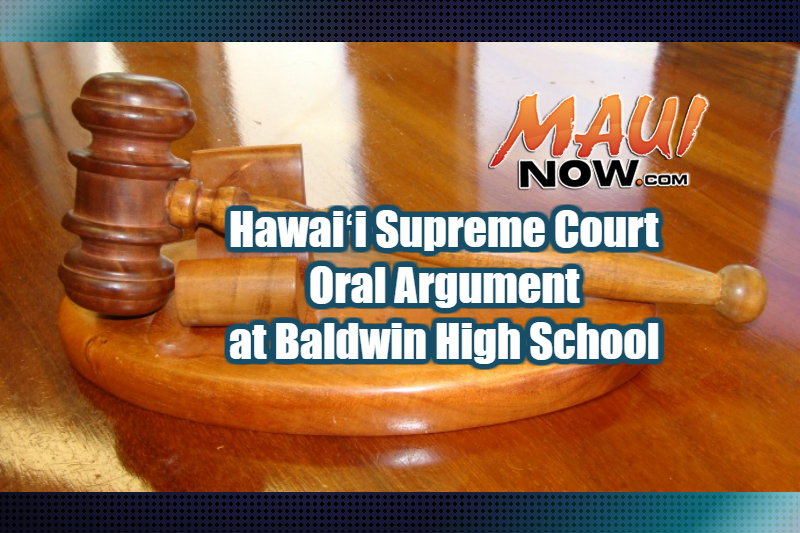Hawaiʻi Supreme Court to Hold Oral Argument at Maui’s Baldwin High School

File image by Wendy Osher. Maui Now graphics.
As part of the Judiciary’s Courts in the Community outreach program, the Hawaiʻi Supreme Court will hear oral argument on April 27, from 10 to 11 a.m. at Baldwin High School on Maui.
The outreach program provides an opportunity for students to learn more about the Judiciary’s role in government and its function in resolving disputes in a democratic society.
To prepare, the participating junior and senior students from Maui and Moloka’i schools study a curriculum developed by the Kamehameha V Judiciary History Center and the Students for Public Outreach and Civic Education of the University of Hawaiʻi’s William S. Richardson School of Law. The students’ study culminates with a moot court activity facilitated by members of the Maui County Bar Association.
The court will hear oral argument in the case of State v. George Fukuoka.
Oral argument will be followed by two separate question-and-answer sessions for the students; one with the attorneys and another with the five justices.
According to a Judiciary brief, the following in a description of the case up for review:
On September 28, 2014, Petitioner was arrested for Operating a Vehicle Under the Influence of an Intoxicant (OVUII) and ordered to appear at the District Court of the Second Circuit, Molokaʻi Division, on October 28, 2014. On October 22, 2014, the State of Hawaiʻi filed a complaint in the district court charging Petitioner with OVUII, inattention to driving, reckless driving, duty upon striking an unattended vehicle or other property, and lack of due care. On October 28, 2014, Petitioner appeared at the district court and entered a plea of not guilty.
Petitioner issued two subpoenas duces tecum on December 9, 2014, to the Maui Police Department seeking personnel and internal affairs files of four MPD police officers involved in his case. On December 18, 2014, counsel for the County of Maui, on behalf of the MPD, moved to quash the subpoenas duces tecum. The court held various hearings to resolve the dispute, and on February 20, 2015, Petitioner and the County agreed to a protective order regarding the files to be produced pursuant to the subpoenas. The court scheduled Petitioner’s trial for March 24, 2015, which was then continued to April 14, 2015 due a previously scheduled matter.
On April 14, 2015, before trial commenced, Petitioner filed with the court a motion to dismiss the complaint with prejudice on the ground that his right to a speedy trial had been violated, based in part on Hawaii Rules of Penal Procedure Rule 48. After hearing argument from both parties, the district court dismissed the complaint without prejudice, and subsequently the court also denied Petitioner’s motion for reconsideration.
Petitioner appealed to the ICA, arguing that petty misdemeanor offenses are not “serious offenses” as a matter of law in the context of HRPP Rule 48 and thus the district court erred in dismissing the case without prejudice. In a Summary Disposition Order, the ICA affirmed the district court’s dismissal without prejudice. The ICA noted that when considering whether to dismiss a case with or without prejudice under HRPP Rule 48, the district court was required to consider (1) the seriousness of the offense, (2) the facts and circumstances that led to the dismissal, and (3) the impact of reprosecution on the administration of HRPP Rule 48 and on the administration of justice. The ICA rejected Petitioner’s argument that petty misdemeanor offenses were not “serious” within the confines of HRPP Rule 48, and determined that the district court in ruling on the seriousness of the offenses was entitled to consider a multitude of factors (including the fact of multiple charges), rather than limiting its analysis to the possible punishment or the constitutional rights implicated by the charged offenses.
On certiorari, Petitioner raises the following question: whether petty offenses are, as a matter of law, “serious” in the context of HRPP Rule 48 when a trial court considers a dismissal with or without prejudice for a violation of this rule, and consequently, whether the district court erred in dismissing the complaint without prejudice.










